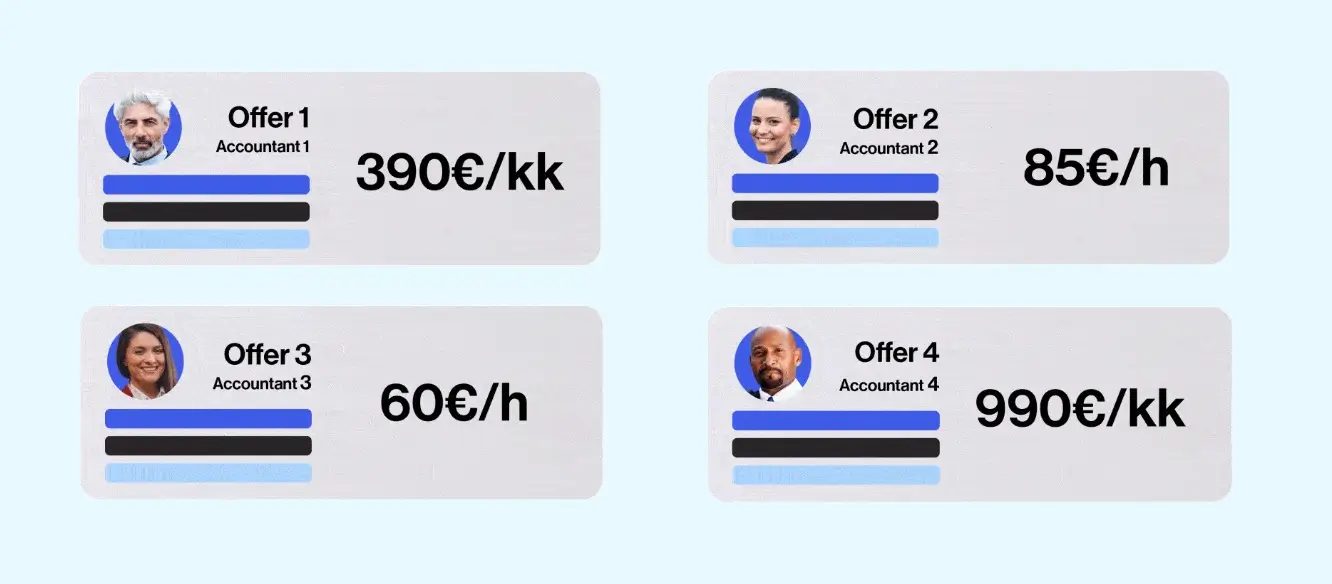Discover the best e-commerce professionals for you - Easy, Today.
Comparing through Offerswap is 100% free
Just fill out a simple form and you are good to go.
Pick the best one.
Choose whether you want to go forward or not.

- It only takes a minute

The search for the perfect partner ends here
Let us take over. We’ll find the best fit for you, with zero cost and zero obligations.
Let’s solve this together
Tell us what you need, review the best matches, and let us do the work. You’ll receive up to 5 personalized offers crafted for you.


Ready to find the right fit?
We’ve got options for ou. Expect at least 4 tailored offers to choose from. Compare them and select the one that aligns with your budget and needs.
Reviews
See what business decision makers think about our service. Finding a provider is now a whole lot easier.
Your free path to the best offers
OfferSwap delivers custom proposals from different providers, all aimed at solving your specific challenges. They all have one goal: to meet your needs.
- 100% free, zero obligations
- Personalized process
- 3-5 offers tailored to your needs
- No login requirement
- Get global and local offers
A guide to creating an online store in 2024 - 10 key points
When you’re looking to set up an online shop for your business, it’s important to ask the right questions of service providers. Here’s a guide to help you make informed decisions:
1. Does the author have previous experience in your industry?
Make sure the service provider you choose understands the specifics of your industry and has worked on similar projects in the past. They should be able to provide relevant references or case studies.
2. Can the author show references or portfolios of previous projects?
Ask to see a portfolio showing the author’s previous work and expertise in e-commerce. This will help you assess their ability to meet your specific needs.’
3. How does the author manage the e-commerce project and what is the timeframe?
Check that the service provider has a clear plan for managing the project, including a timetable for the different stages of the project.
4. How does the author ensure the usability and SEO-friendliness of the online store?
Ask for an explanation of how to optimise your online shop for user-friendliness and search engines. SEO is a critical factor for the success of an online store.
5. What technologies and platforms does the author use to build the online store?
Ask which technologies and platforms, such as Shopify, WooCommerce or Magento, are used and why they are right for your online store.
6. How will the author manage the maintenance and support of the online shop once the project is completed?
Find out how technical support and maintenance will be handled after the project, and what the potential maintenance costs will be.
7. How does the author ensure the security of the online shop?
Ask what methods are used to ensure the security of your online shop and customer data, such as SSL certificates and security protection.
8. How will your online shop scale as your business grows?
Make sure that the design of your online shop takes into account potential business growth and expansion.
9. What should you do if you are not satisfied with the result?
Check how any changes and corrections will be handled if the end result is not what you expected.
10. Is it easy to manage and update your e-commerce content without coding skills?
Make sure you have a user-friendly management system and, if necessary, training to update and manage your online shop.
These questions will help you choose the right partner to build your online store and ensure that the end result supports your business goals and growth.
Need support with your Offer?
We’re here to assist. Start a conversation in the chat or check how Offerswap works by yourself.
The price of online shopping - these are the 7 things that matter most
The cost of developing an online store is influenced by several factors. Here are the seven most important factors that determine the cost of online shopping:
Platform choice: The e-commerce platform you choose (e.g. Shopify, WooCommerce, Magento) has a significant impact on the price. Different platforms offer different price structures and features.
Design and customisation: bespoke design and customisation of the site will increase the price. Ready-made themes are usually cheaper.
Functionality and integrations: additional features such as multiple payment methods, social media integrations and customer data management can increase the overall cost of a project.
Volume of content and product information management: the volume of products and their information in an online store affects the scope of work and therefore the price.
Mobile optimisation and responsiveness: adapting your online store for different devices and screens can require additional work and thus increase the price.
SEO and marketing tools: optimising a website for search engines and various marketing tools are often additional services that can increase the budget of a project.
Maintenance and support: ongoing maintenance, updates and technical support for your online store usually incur monthly or annual costs.
By taking these factors into account, you will get a more complete idea of what it will cost to develop your online store. It is important to discuss these in detail with your service provider to get an accurate price estimate.

